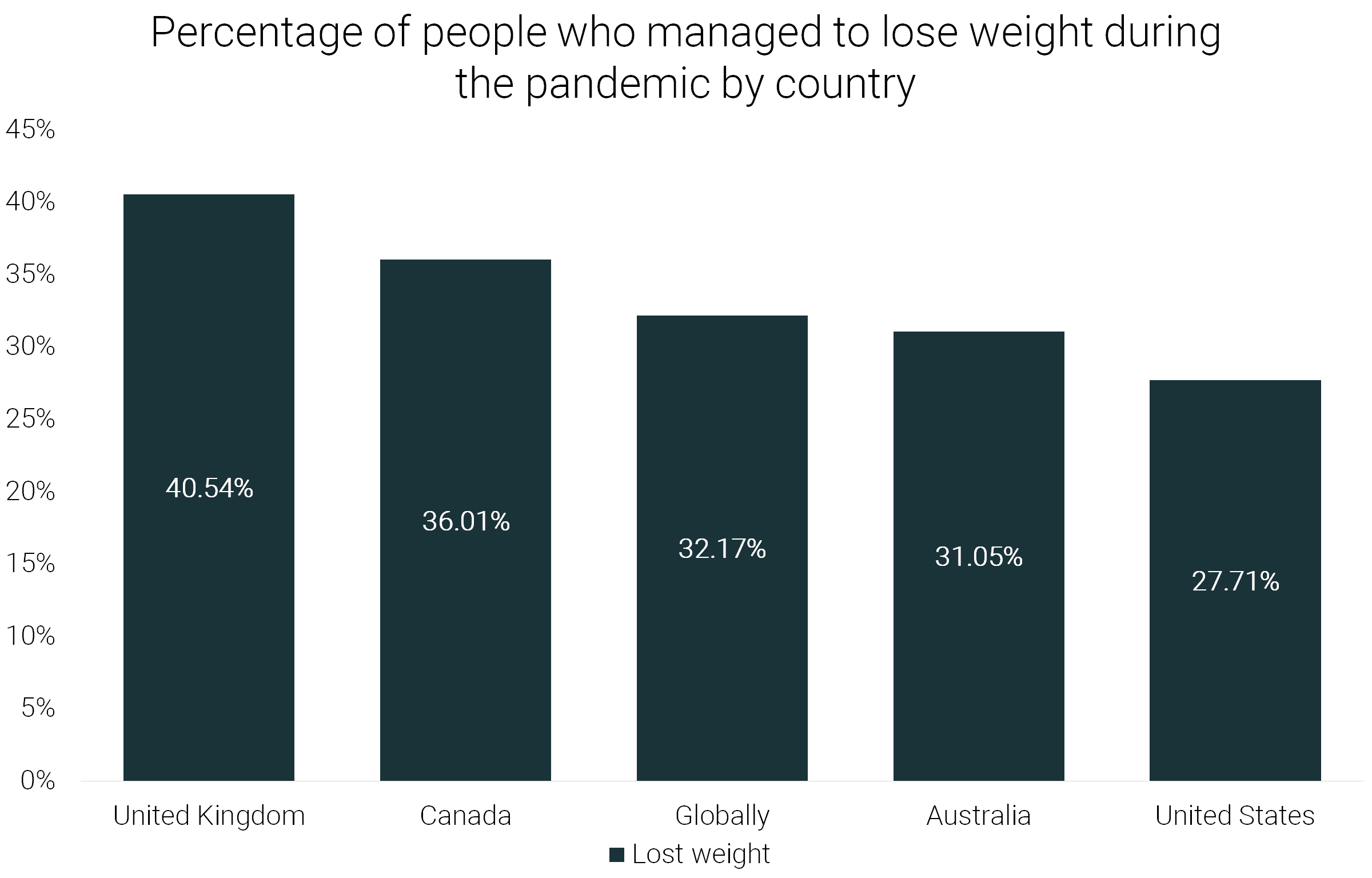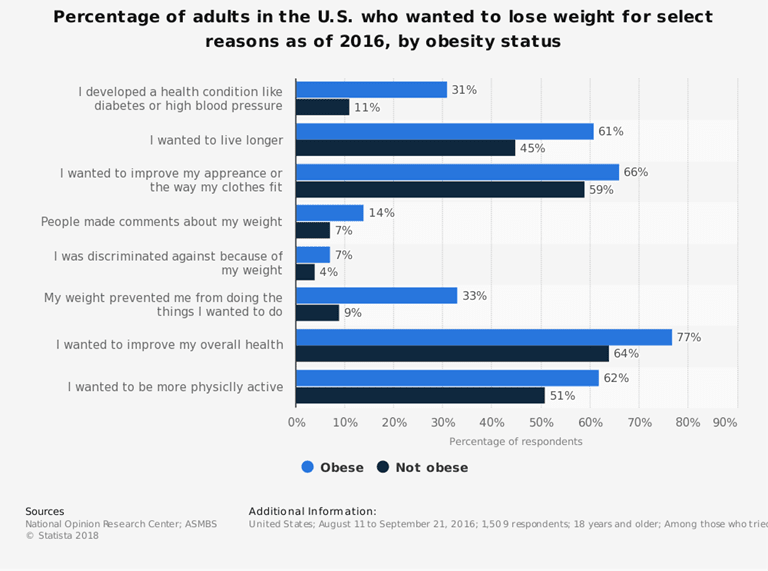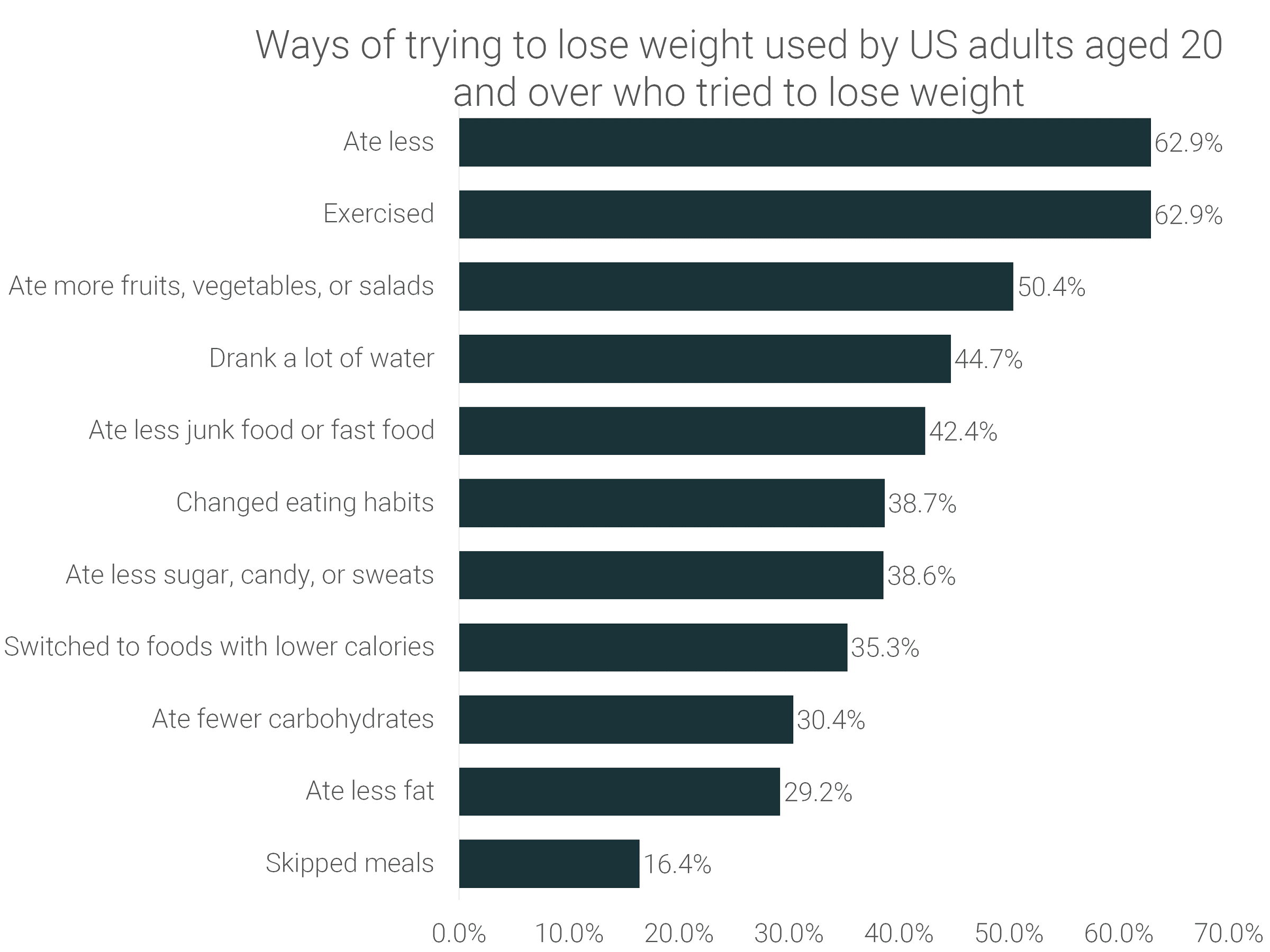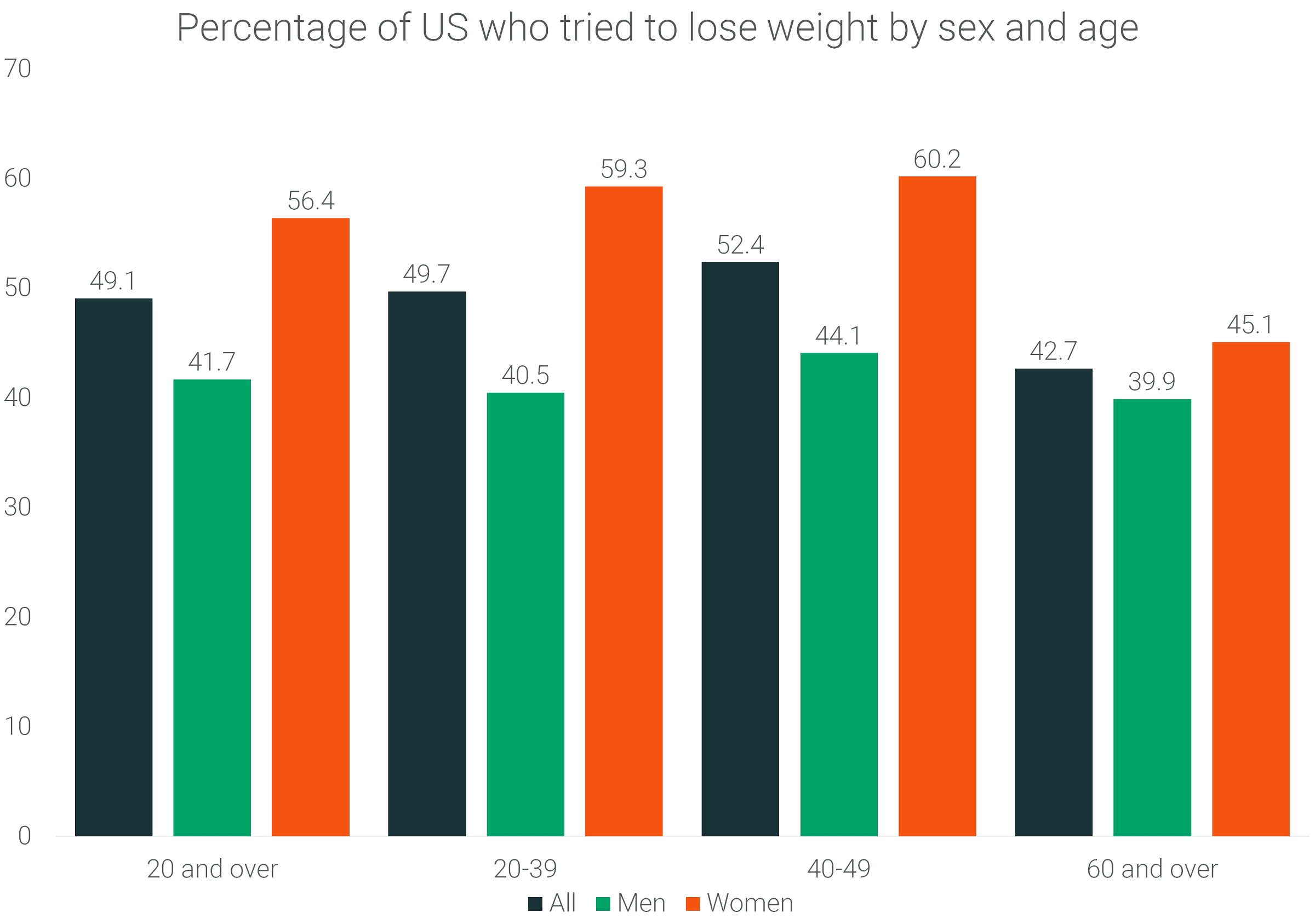40+ Weight Loss Statistics 2021
We scoured through various studies and polls, researching and collecting data regarding weight loss to provide a comprehensive breakdown of:
- Weight loss statistics
- Weight loss success statistics
- Weight loss and diet failure statistics
- Stats and facts on why diets don't work
- Weight loss demographics
- Weight loss industry
Weight loss statistics
- RunRepeat's quarantine weight gain survey of 19,903 people surprisingly revealed that 32.17% of respondents managed to lose weight during the pandemic. [September - 2020]

- The UK had the greatest success with losing weight during the pandemic (40.54%) while the US had the least (27.71%)
- Each year, it has been estimated that over 44 million Americans go on a diet. [2018]
- In a study conducted between 2013 and 2016, it was determined that 49.1% or about half of the American adult population tried to lose weight during the previous year. [2013-2016]
- According to a study, the cost of losing weight amounts to $155 to $546 per kilogram, depending on whether you take oral medication or diet products or enrolled in a diet programme. [2014]
- According to a poll, 38% of Americans have tried to lose weight between 3 to 10 times. Meanwhile, 45% of men have never tried any diets, which is significantly higher than the 23% of women who have never tried dieting. [2005]
- Women aged 18 to 49 have attempted to lose weight an average of 9 times. Meanwhile, the number climbs to 11, for women who are 50 and over. Meanwhile, men report an average of 5 weight loss attempts across both age groups. [2005]
- A person's perception of their health also affects weight maintenance. Those who believe they are in excellent health only tried to lose weight an average of 4 times. As for those who think they are in good health, the number doubled. However, those who perceive their health as poor stated that they have tried losing weight 13 times. [2005]
- According to a recent survey, 40 million Americans are willing to give up social media to lose 10 pounds or more. [2020]
- Meanwhile, the percentage of adults willing to give up sex is 22% and 17% will ditch their favourite show or streaming service if that means losing 10 pounds or more. [2020]
- The percentage of adults in America who have tried diet meal plans delivered to their homes is 8%. [Gelesis - 2020]
- A 2017 survey revealed that 82% of people believed that they are solely responsible for their weight loss. [2017]
- Some of the top reasons obese people have for wanting to lose weight include developing a health condition (31%), desire to live longer (61%), wanting to improve appearance (66%), and improving overall health (77%), and increasing physical activity (62%). [2018]

Long term weight loss success and weight management statistics
- To be considered a successful weight loss, a person needs to lose 10% of their body weight and keep it off for more than a year. [2005]
- According to research done by The American Journal of Clinical Nutrition, more or less 20% of obese people who managed to lose 10% of their body weight were able to keep it off for at least a year. [2005]
- The AJCN research also showed that long-term weight loss is easier for people who were able to keep off the weight for 2 to five years after they started their journey. [2005]
- According to the NIH, an obese or overweight person losing 10% of their body weight in a 6 month period is a reasonable goal and can motivate a person to take the next step in losing more weight. [1998]
- An average weight loss of 1-2 pounds a week is considered a realistic and safe weight loss goal. However, after the 6-month period, weight loss usually plateaus which can discourage some to continue with their diet and exercise regimens. [1998]
- The most common route taken by people who want to achieve a healthy weight is increased physical activity (62.9%) followed by restricting calorie intake (62.9%). On the other hand, 50.4% started adding more healthy food like fruits, vegetables, and salads to their diets in order to lower their weight. Meanwhile, 44.7% believed that increasing water intake will help them shed pounds. [2013-12016]
- To start losing weight, an average man needs to reduce calorie intake to 2,000 a day, while an average woman only needs 1,500 calories a day.

- Sprint interval training is an incredibly effective form of exercise that has been shown to help people lose 39.95% more body fat than HIIT, with 60.84% less time spent exercising.
Weight regain and diet failure statistics
- The Centre for Weight and Eating Disorders says 65% of dieters return to their pre-diet weights in the span of three years.
- In the meta-analysis of 29 long-term weight loss studies, it was determined that within 2 years after weight loss, more than half of the weight lost during the process was regained. And after five years, weight regain is up by 80%. [2019]
- According to a 5-year longitudinal study, adolescent males and females who go on diets using weight loss medications, laxatives, and diuretics, are likely to have weight issues when they enter adulthood, compared to adolescents that do not go on a diet. [2006]
Stats and facts on why diets don't work (and dieters struggle so much)
- According to a study, though people who go on macronutrient-based diets (low-carb, low fat, Atkins, Zone) lose 5-10% of their weight in the first 6 months of dieting, the weight loss diminishes by the 1-year mark. [2018]
- Physiologist Kevin Hall and his team studied the contestants of the popular TV show The Biggest Loser. The study of contestants determined that 6-years after the show, the resting metabolic rate of the participants is below 400 calories, which led to them gaining most of their weight back. [2016]
- A recent survey showed that 71% of Americans gained weight during the pandemic, with 63% of survey participants stated that long-term maintenance is hard during the lockdown. [2020]
- 116 million Americans find that losing weight feels as miserable as being overweight. [2020]
- Some of the barriers to achieving their weight loss goals include the high cost of healthy foods, lack of time for physical activities, calorie reduction, and slow progress discourages them. [2020]
- 48% of survey respondents didn't feel that their health care providers helped them enough to achieve their weight goal. [2020]
Weight loss demographics
- When race is considered, non-Hispanic white adults are more likely to try and lose weight at 49.4% followed by 49.1% of Hispanic adults. Meanwhile, only 48% of non-Hispanic blacks have tried to lose weight, which is still higher compared to 41.4% of non-Hispanic Asian adult population. [2013-2016]
- Another factor that affects a person's interest in losing weight is their family income. Those with an income greater than 350% of the federal poverty level, about 53.7%, were more likely to try to lose weight. Meanwhile, the number drops to 48.7% and 42.9% for people with an income greater than 130% or equal to 350% FPL and those with an income of less than or equal to 130% of FPL, respectively. [2013-2016]
- An adult's weight status affects their desire to lose weight. People who are obese, about 66.7%, are more likely to try to lose weight compared to 49% of overweight adults. Surprisingly, 26.5% of under- or normal-weight people also tried to lose weight during the same period. [2013-2016]
- 52.4% of middle-aged people (40-59 years old) were the most likely age range to try and lose weight followed by 49.7% adults aged 20-39 and last, are the seniors aged 60 and over at 42.7%. However, the study suggests that age doesn't affect a person's weight loss. [2013-2016]
- There were more women (56.4%) compared to men (41.7%) who tried to reduce their weight in all age groups and races. [2013-2016]
- According to a weight loss survey, women with kids (30%) are more likely to list barriers in achieving a healthy lifestyle than women without kids (21%). [2020]

- A survey released in 2016 revealed that 48% of Britons tried to lose weight during the previous year. The number is higher in women at 57%. Moreover, 67% of the survey respondents say that they are on a diet most of the time. [2016]
- The percentage of adults in Canada that have gone on a diet is 42% during the previous year, with 48% of the dieters being women. [2017]
- In 2021, the percentage of adults in America who wish to live a healthier lifestyle is 60%.[2020]
- With the pandemic still raging in 2021, healthy weight is now the top priority of 59% of women and 47% of men, with a total of 51% hoping to lose weight. [2020]
Weight loss industry stats
- Americans spend about $33 billion each year on diet products, from weight loss medications, weight loss programmes, and surgery. [2018]
- In 2019, the U.S. weight loss market was priced at $72 billion. The market includes spending on diet food and drinks, gym memberships, multi-level marketing diet plans, diet foods, food delivery meals, meal replacements, diet pills, weight management surgery such as gastric bypass, low-calorie frozen food, and books and DVDs on exercise and dieting. [2019]
- Weight Watchers remains one of the most successful commercial weight loss companies in the world, reporting 5 million subscribers and $334 million in revenue during the second quarter of 2020. [2020]
About RunRepeat
RunRepeat is all about unbiased shoe reviews. We spend countless hours on testing the shoes (running, walking, hiking, training) and lab-testing the shoes in our lab, so you won't have to, allowing you to make informed decisions before clicking that buy button.
If you're part of the percentage of adults plagued by the dreaded Quarantine 15 and deem 2021 to be the year for self-improvement, you can check out our vast collection of running and training shoes to help you experience the health benefits of exercise. Meanwhile, if you're more interested in CrossFit, there's the Nike Metcon 9 and Reebok Nano X3 that provide wearers with steadiness during weight lifting, enough flexibility at the forefoot for burpees, or sled pushes, and adequate cushioning to absorb shock during plyometrics or running.
Use of content
- We are happy to give interviews on this topic and related topics at any time. For this purpose or for other questions regarding our research reach out to Nick Rizzo at nick@runrepeat.com
- Feel free to use material from this page in any web coverage of the topic, we just ask that you refer, and link, back to this original source.
https://www.bmc.org/nutrition-and-weight-management/weight-management
https://www.cdc.gov/nchs/products/databriefs/db313.htm
https://pubmed.ncbi.nlm.nih.gov/24962106/
https://news.gallup.com/poll/17890/six-americans-attempted-lose-weight.aspx
https://www.statista.com/statistics/317910/us-households-reasons-for-watching-diet/
https://www.ncbi.nlm.nih.gov/pmc/articles/PMC3339766/
https://www.cdc.gov/healthyweight/losing_weight/index.html
https://www.ncbi.nlm.nih.gov/pmc/articles/PMC5764193/
https://pubmed.ncbi.nlm.nih.gov/27136388/
https://www.bmj.com/content/369/bmj.m696
https://www.insightswest.com/news/two-in-five-canadians-tried-to-lose-weight-over-the-past-year/
https://blog.marketresearch.com/u.s.-weight-loss-industry-grows-to-72-billion
